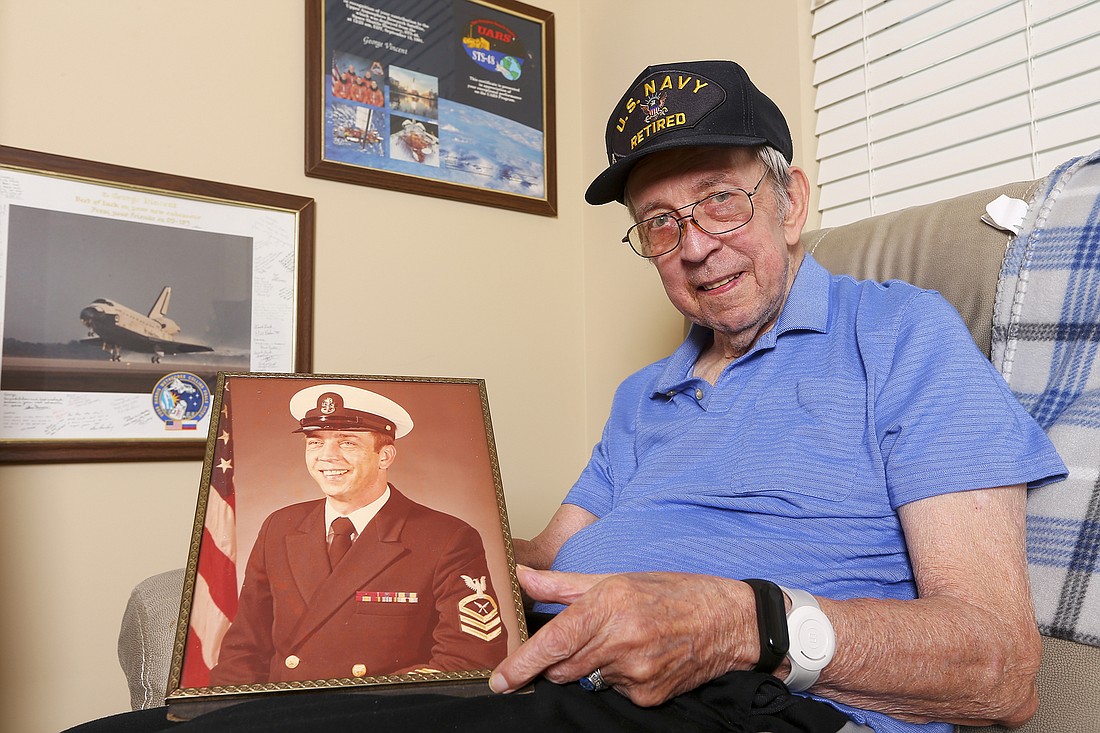- April 4, 2025
-
-
Loading

Loading

The sea and the sky always seemed to call out to Windermere resident George Vincent — and he’s glad he answered. U.S. Navy veteran George Vincent, 77, is currently a resident at The Sheridan at Windermere. Originally from Philadelphia, Vincent always had a love for the sea — his father bought him a 12-foot sailboat for $25 when he was 8 years old that he raced off Jersey Shore, New Jersey.
“When I was growing up as a child, my parents used to take us to the beach all the time,” Vincent said. “I just grew a love for the water.”
At age 11, Vincent found himself on a peninsula surrounded by water when his family moved to Titusville. Six years later, Vincent decided to get even more acquainted with the ocean, joining the Navy April 2, 1959.
He added that he wasn’t drafted — he chose to go.
“It was either my choice or their choice,” Vincent said.
“I went to the Navy — I didn’t want to be a ground-pounder.”
Vincent went to active duty after graduating high school, coming aboard the USS Wallace L. Lind DD-703 — a slight upgrade from his 12-foot sailboat off Jersey Shore.
“It was cool — especially when we did gun practice,” said Vincent, adding that the ship carried about 250 people.
During his time in the Navy, Vincent rose through the ranks and reached the level of chief petty officer. He traveled the world and saw Portugal, the Canary Islands, Italy, Jamaica, Puerto Rico and New York City.
The nearest Vincent came to combat was the Bay of Pigs invasion — his ship was at Guantanamo Bay and served as an escort taking civilians back to the United States while guarding the entry to the bay, as well.
After three years on the Wallace L. Lind, Vincent went back to the Navy Reserves and spent two-and-a-half years working for a national publishing company in Washington, D.C. He rejoined active duty in 1965, though.
“I enjoyed sitting on the focsle and just letting the wind blow,” he said.
For the rest of his military career — a span of 20 years — Vincent trained seamen in the Navy Reserves in Los Angeles, Birmingham, Miami, New Orleans and Pearl Harbor.
He took pride in taking the younger people under his wing and preparing them for life in the Navy. Vincent taught them general military procedures, damage control and military courtesy.
“I loved it,” he said. “I was passing information to them that I had learned.”
Although Vincent was in the Navy during the Vietnam War, he never fought in it, though he knew some people that did — some who were wounded and some who never came back.
“When I was stationed in Birmingham, I had a commanding officer who was a six-and-a-half-year prisoner,” Vincent said. “He was one of the greatest guys I ever met in my life. He was tortured during his incarceration — he would throw his shirt off and there were scars from cigarettes being put out on him. It was crazy stuff.
“It made me mad,” he said. “It made me do a better job in training.”
On Dec. 1, 1983, Vincent left the Navy to take care of his mother but ultimately made the transition from sea to space. For 25 years until his retirement, Vincent worked for multiple companies at the Kennedy Space Center as a payload operations engineer. It was his job to make sure that payloads were ready to go into orbiters before they were launched.
Like his love for the ocean, Vincent’s fascination with space went back to his childhood. He remembers watching launches in Titusville during the early days of the space program.
The second half of his career gave him a front-row seat to space exploration — including the launch of the Hubble Space Telescope and multiple labs, he said.
“Every day, I went to work and I was making history,” Vincent said.
When Vincent thinks about the freedoms Americans enjoy, his mind goes to many of the countries he saw while traveling with the Navy — places that were far less fortunate.
“(American freedom) means that I can do whatever I want to do whenever I want to do it,” Vincent said. “I would fight for that. We have the freedom to do what we want.”